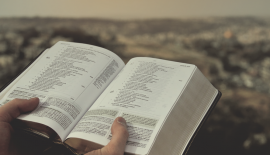Weekly Update: What does it mean to be a Jewish state?
The results of the elections in Israel last week have provoked a strong debate within Israeli society (and the Jewish world generally) about what it means to be a “Jewish” state.
The rise of the “National religious” party led by Ben-Gvir and Smotritch – and their likely inclusion in the soon-to-be-formed Israeli government under leadership of Benjamin Netanyahu – has caused many to be concerned that strong defence of the Jewish character of the nation will result in oppression of the non-Jewish communities.
This is an old debate. It is interesting, for example, to recall that the Balfour declaration (1917) and Mandate for Palestine (1992) anticipated this dilemma. While calling for the re-establishment of a homeland for the Jewish people in Palestine, they also stated that “nothing shall be done which may prejudice the civil and religious rights of existing non-Jewish communities in Palestine.”
The truth is that the Jewish people have always been deeply conscious of their responsibility and calling not only to have a strong Jewish identity, but also to look after others.
In fact, it may be argued the latter is the essence of the former. True Judaism is about being a blessing and light to the nations.
Indeed, while there have always been extremists, the vast majority of Jews simply want to live in peace and harmony with the non-Jews in the land. And Israel, while not perfect, is a strong democracy governed by the rule of law. The vigorous internal debate about the separation of powers is sign of this, not evidence of the opposite.
It is wrong to criticize the people of Israel for the outcome of these elections. The people of Israel will work out a new government, and there is no doubt that, while there is a clear call to enforce strong internal and external security measures, the government will also be sensitive of the need to respect and integrate the Arab communities in the land.
We should allow the Israeli democratic system to play itself out before making unnecessary criticisms or predictions of disaster – see the very balanced article by Elliott Abrams on this issue.
Our task as Gentiles outside the land is to pray for the people of Israel in the coming period, and especially for its leaders – that those who are forming the new government will be led by the Spirit of unity, discernment and love.
What to think about Religious Zionists, Netanyahu, and tales of doomsday
Elliott Abrams at Times of Israel: “There is a striking parallel between the comments being heard from the left in the United States about the meaning of a possible Republican victory November 8th, and from the left in the United States—as much as or more than in Israel—about the meaning of the victory of the right in the Israeli election on November 1st. The meaning, we are told, is the end of democracy.”
> Read more..
The End of a Ballot Box Marathon?
Johannes Gerloff writes at c4israel.org: “Itamar Ben Gvir or Bezalel Smotritch (“Religious Zionism”) are unquestionably the big winners of this election, with an increase of eight members of Knesset. How partly racist or homophobic statements are translated into Israeli daily politics will be interesting. The same applies to the weight of the ultra-Orthodox, who on the one hand question English and mathematics as compulsory school subjects, but whose women at the same time massively push into the IT industry as employees.”
> Read more..
Netanyahu primed to receive mandate to form gov’t
JNS.org reports: “Likud, Religious Zionism, Shas and United Torah Judaism follow the script by recommending that the Israeli opposition leader be tapped to form the next government, leaving no doubt he will receive the mandate to do so.”
> Read more..
My brethren on the left, give me a chance
Itamar Ben-Gvir writes at JNS.org: “If you listen to what we have to say, you’ll discover that we are all brothers, and that we agree on 90% of the issues.”
> Read more..
Praise | Romans 9-11 with Johannes Gerloff #70
Like a hiker who has reached the summit of an Alpine ascent after a long and strenuous tour the apostle turns around and looks back and marvels. All pondering God’s word ought to lead to worship.
SCRIPTURE FOR THE WEEK:
18 “‘Follow my decrees and be careful to obey my laws, and you will live safely in the land. 19 Then the land will yield its fruit, and you will eat your fill and live there in safety. 20 You may ask, “What will we eat in the seventh year if we do not plant or harvest our crops?” 21 I will send you such a blessing in the sixth year that the land will yield enough for three years.22 While you plant during the eighth year, you will eat from the old crop and will continue to eat from it until the harvest of the ninth year comes in.
23 “‘The land must not be sold permanently, because the land is mine and you reside in my land as foreigners and strangers. 24 Throughout the land that you hold as a possession, you must provide for the redemption of the land.
25 “‘If one of your fellow Israelites becomes poor and sells some of their property, their nearest relative is to come and redeem what they have sold.26 If, however, there is no one to redeem it for them but later on they prosperand acquire sufficient means to redeem it themselves, 27 they are to determine the value for the years since they sold it and refund the balance to the one to whom they sold it; they can then go back to their own property.28 But if they do not acquire the means to repay, what was sold will remain in the possession of the buyer until the Year of Jubilee. It will be returned in the Jubilee, and they can then go back to their property.





